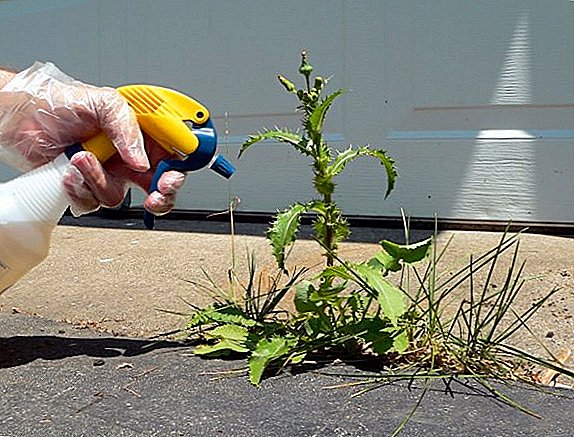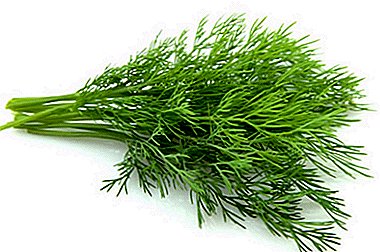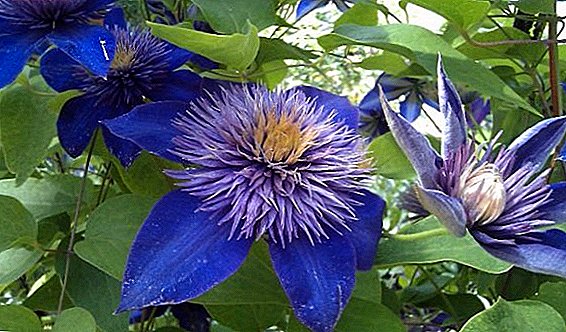 Clematis, clematis, vines - as soon as they do not call this delightful flower. You can meet him, probably, in every corner of the globe. At the moment, scientists have deduced more than 300 species of this plant - from decorative, balcony exhibits to climbing subspecies, which are used to decorate walls, gazebos and other things. The flower loves light and moisture, unpretentious. If you want to see abundantly blooming clematis, it needs to pay a little attention, generously, and most importantly, feed it with various fertilizers in time. The plant is difficult to tolerate the winter, but with proper care will please you before the onset of cold weather. How and what to feed clematis, we will share in this article.
Clematis, clematis, vines - as soon as they do not call this delightful flower. You can meet him, probably, in every corner of the globe. At the moment, scientists have deduced more than 300 species of this plant - from decorative, balcony exhibits to climbing subspecies, which are used to decorate walls, gazebos and other things. The flower loves light and moisture, unpretentious. If you want to see abundantly blooming clematis, it needs to pay a little attention, generously, and most importantly, feed it with various fertilizers in time. The plant is difficult to tolerate the winter, but with proper care will please you before the onset of cold weather. How and what to feed clematis, we will share in this article.
How to feed clematis, fertilizer types
At different times of the year clematis require care and feeding. One of the most essential minerals is nitrogen. Without it, the leaves of clematis will fade, turn yellow, the sprouts will no longer reach up, and the flowers will lose their charm, will be dull and small. For abundant flowering plants also need large quantities of potassium. Clematis almost always needs a variety of nutrients. Fertilize the flower with diluted manure or bird droppings.
 Alternate organic matter with mineral dressings, ammonium nitrate or nitroammofoskoy. Another vital mineral is phosphorus. Its lack may cause leaf darkening. It is recommended to add phosphorus in the form of bone meal in the preparation of the soil in the fall or fertilize with superphosphate. Clematis also needs micronutrient fertilizers. You can buy them in the store or make them yourself. When foliar processing, try to cover the inside of the sheet. But do not forget that during flowering you should not fertilize the flower, otherwise you risk reducing the activity of flowering.
Alternate organic matter with mineral dressings, ammonium nitrate or nitroammofoskoy. Another vital mineral is phosphorus. Its lack may cause leaf darkening. It is recommended to add phosphorus in the form of bone meal in the preparation of the soil in the fall or fertilize with superphosphate. Clematis also needs micronutrient fertilizers. You can buy them in the store or make them yourself. When foliar processing, try to cover the inside of the sheet. But do not forget that during flowering you should not fertilize the flower, otherwise you risk reducing the activity of flowering.
Did you know? In the spring, clematis can grow up to 12 centimeters per day!
When to start feeding clematis
If you have fertilized the ground well before planting clematis, then the first feeding can be done in a year or even two. But if the soil is poor, then in the first autumn or spring it will be necessary to introduce humus or compost with ashes. Before starting fertilizer, water the plants abundantly. And remember an important point: clematis does not tolerate a concentrate of fertilizers in the soil, so it is desirable to conduct all dressings in a diluted form. Than to feed the clematis in the spring, summer and autumn, we described below.
Did you know? With proper care, fertilizing and watering, clematis can grow in one place for up to 30 years!
All about spring clematis feeding
 How to care for clematis in the spring? During this period, the plant begins to grow abundantly and develop shoots. It is at this point that the flowers need a lot of nitrogen. Great for this is suitable diluted cow dung or bird droppings, diluted in proportions of one to ten. If it is not possible to use organic fertilizers, urea can be taken. All bait pre-mix with water.
How to care for clematis in the spring? During this period, the plant begins to grow abundantly and develop shoots. It is at this point that the flowers need a lot of nitrogen. Great for this is suitable diluted cow dung or bird droppings, diluted in proportions of one to ten. If it is not possible to use organic fertilizers, urea can be taken. All bait pre-mix with water.
After the start of shoot growth, it is desirable to conduct surface treatment with a weak urea emulsion. Before the onset of summer, all plants must be watered with so-called lime milk. To prepare it you just need to mix 150-200 g of chalk in ten liters of water. Feed and care for clematis in the spring should be once a week.
Important! When summer watering do not let the water jet in the middle of the bush.
How to fertilize clematis in the summer
 In the summer during the swelling of the buds, nitrogenous fertilizers are also needed, but the more important elements during this period are potassium and phosphorus. For fertilizing, you can use complex mineral fertilizers. Ammophoska or nitrophoska perfectly suited for clematis. But they must be supplemented with liquid, fermented manure or tincture of weeds. Next begins the flowering process. During this period, it is better to stop feeding the plant if you want to prolong flowering. After clematis has faded, you need to give the plant more potassium and phosphorus. Well suited drug "Autumn" or superphosphate. In August, it is worth limiting nitrogen fertilizers. Nitrogen will promote the active growth of leaves, which can adversely affect the plant in the fall.
In the summer during the swelling of the buds, nitrogenous fertilizers are also needed, but the more important elements during this period are potassium and phosphorus. For fertilizing, you can use complex mineral fertilizers. Ammophoska or nitrophoska perfectly suited for clematis. But they must be supplemented with liquid, fermented manure or tincture of weeds. Next begins the flowering process. During this period, it is better to stop feeding the plant if you want to prolong flowering. After clematis has faded, you need to give the plant more potassium and phosphorus. Well suited drug "Autumn" or superphosphate. In August, it is worth limiting nitrogen fertilizers. Nitrogen will promote the active growth of leaves, which can adversely affect the plant in the fall.
Important! Avoid chlorine fertilizer. It is contraindicated in clematis.
Features of feeding clematis autumn
In the autumn, clematis feeding can be stopped. In mid-September, you will only need to cover the base of bushes with wood ash. The ash should be well sifted and tightly rammed under the base. It is recommended to use about half a kilogram of ash per bush.
 With the arrival of winter, most clematis varieties need shelter. For this, the plant is cut, a layer of leaves and peat is laid out at the bottom of the box, the plants are laid down and covered with various materials. It can be leaves, branches and even foam. The main thing is not to overcool the plants and give them an air flow. In the spring, when you open clematis, do it gradually so as not to overcool the plant.
With the arrival of winter, most clematis varieties need shelter. For this, the plant is cut, a layer of leaves and peat is laid out at the bottom of the box, the plants are laid down and covered with various materials. It can be leaves, branches and even foam. The main thing is not to overcool the plants and give them an air flow. In the spring, when you open clematis, do it gradually so as not to overcool the plant.
Such a handsome man as clematis, you need to pay only a little of his attention, and he will please you for a long time. After reading this article, you know how to fertilize clematis, in what period to do it. And now you can safely go to your site for planting these wonderful flowers.












